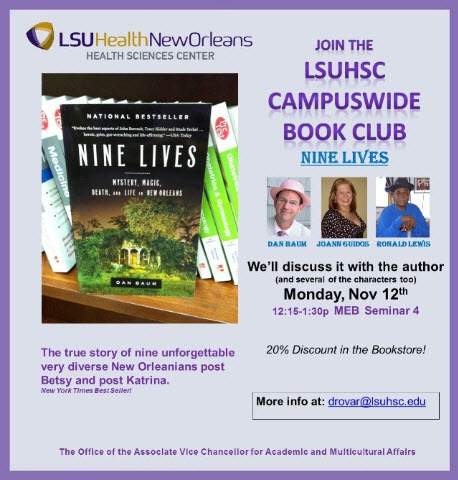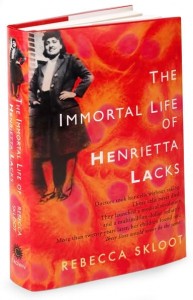?á
The Campuswide Book Club will meet on Monday, November 12th to discuss it’s latest title, Nine Lives. The author and some of the New Orleanians featured in the book will be in attendance.
Location: Medical Education Building, 1901 Perdido, Seminar rm. 4
Time: 12:15 – 1:30 pm Monday, November 12th
The LSUHSC Campuswide Book Club is sponsored by the Office of the Associate Vice Chancellor for Academic and Multicultural Affairs.

Available for checkout in the library
Do patients have rights to revenue streams should their tissue hold value for biomedical research? Science Journal’s Policy Forum discusses the ethics of tissue research as examined in Rebecca Skloot’s book?áthe Immortal Life of Henrietta Lacks, which was LSUHSC’s first book club selection ealier this year. Physician-investigators weigh in on property rights in human tissue and investigators’ obligations to individuals from whom they seek tissue for research.
Full citation: Science 6 July 2012:
Vol. 337 no. 6090 pp. 37-38
DOI: 10.1126/science.1216888?á(barcode & PIN?árequired?áoff campus)
POLICY FORUM -?áRESEARCH ETHICS
Paying Patients for Their Tissue: The Legacy of Henrietta Lacks
Robert D. Truog -?áChildren’s Hospital Boston, Boston, MA 02115, USA,?áAaron S. Kesselheim?áBrigham & Women’s Hospital, Boston, MA 02120, USA, Steven Joffe -?áDana-Farber Cancer Institute, Boston, MA 02115, USA.

Now available in the library
?á
The Book Club will gather on Monday, May 7th from 12:15pm to 1:45pm in MEB Lecture Room 4 for a ÔÇ£brown bagÔÇØ discussion of the book and its relevance for the work we all do. A distinguished panel featuring Drs. Corey Hebert, Cassandra Youmans, and John Estrada will lead this important discussion.
Her name was Henrietta Lacks, but scientists know her as HeLa. She was a poor, black tobacco farmer whose cellsÔÇötaken without her knowledge in 1951ÔÇöbecame one of the most important tools in medicine, vital for developing the polio vaccine, cloning, gene mapping, in vitro fertilization, and more. HenriettaÔÇÖs cells have been bought and sold by the billions, yet she remains virtually unknown, and her family canÔÇÖt afford health insurance.
The Immortal Life of Henrietta Lacks (Broadway Paperbacks 2011), by Rebecca Skloot, is an enjoyable read that delves into issues of health care disparities and medical ethics. An award winning piece of non-fiction, this book was featured on over 60 criticsÔÇÖ best of the year lists and was awarded the 2010 Wellcome Trust Book Prize, the American Association for the Advancement of ScienceÔÇÖs Award for Excellence in Science Writing, the 2011 Audie Award for Best Nonfiction Audiobook, and a Medical JournalistsÔÇÖ Association Open Book Award.

Now available in the library
Her name was Henrietta Lacks, but scientists know her as HeLa. She was a poor, black tobacco farmer whose cellsÔÇötaken without her knowledge in 1951ÔÇöbecame one of the most important tools in medicine, vital for developing the polio vaccine, cloning, gene mapping, in vitro fertilization, and more. HenriettaÔÇÖs cells have been bought and sold by the billions, yet she remains virtually unknown, and her family canÔÇÖt afford health insurance.
The Isché Library is proud to announce that the inaugural LSUHSC?áCampuswide Book Club selection is now?áavailable in the Reserve Collection.
The Immortal Life of Henrietta Lacks?á(Broadway Paperbacks 2011), by Rebecca Skloot,?áis an enjoyable read that delves into issues of health care disparities and medical ethics. An award winning piece of non-fiction, this book was featured on over 60 criticsÔÇÖ best of the year lists and was awarded the 2010 Wellcome Trust Book Prize, the American Association for the Advancement of ScienceÔÇÖs Award for Excellence in Science Writing, the 2011 Audie Award for Best Nonfiction Audiobook, and a Medical JournalistsÔÇÖ Association Open Book Award.
The Book Club will gather on Monday, May 7th from 12:15pm to 1:45pm in MEB Lecture Room 4 for a ÔÇ£brown bagÔÇØ discussion of the book and its relevance for the work we all do.?á A distinguished panel featuring ?áDrs. Corey Hebert, Cassandra Youmans, and John Estrada will?álead this important discussion.
For more information contact drovar@lsuhsc.edu

 myLSUHSC
myLSUHSC
